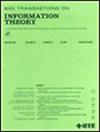关于代码和网格的麦克威廉定理
IF 2.2
3区 计算机科学
Q3 COMPUTER SCIENCE, INFORMATION SYSTEMS
引用次数: 0
摘要
在过去的几十年里,人们对码和格之间的类比进行了广泛的研究。在这种情况下,MacWilliams恒等式是函数的Jacobi-Poisson求和公式的有限类比。在随机格理论的激励下,考虑了MacWilliams定理的统计显著性。事实上,麦克威廉姆斯分布提供了一个有限的模拟经典高斯分布。特别是,码的商空间上的MacWilliams分布在统计上接近均匀分布。在格的背景下,sol本文章由计算机程序翻译,如有差异,请以英文原文为准。
On the MacWilliams Theorem Over Codes and Lattices
Analogies between codes and lattices have been extensively studied for the last decades. In this context, the MacWilliams identity is the finite analog of the Jacobi-Poisson summation formula of the theta function. Motivated by the random lattice theory, the statistical significance of MacWilliams theorem is considered. Indeed, the MacWilliams distribution provides a finite analog of the classical Gauss distribution. In particular, the MacWilliams distribution over quotient space of a code is statistically close to the uniform distribution. In the context of lattices, the analogy of MacWilliams identity associated with nu-function was conjectured by Solé in 1995. We give an answer to this problem.
求助全文
通过发布文献求助,成功后即可免费获取论文全文。
去求助
来源期刊

IEEE Transactions on Information Theory
工程技术-工程:电子与电气
CiteScore
5.70
自引率
20.00%
发文量
514
审稿时长
12 months
期刊介绍:
The IEEE Transactions on Information Theory is a journal that publishes theoretical and experimental papers concerned with the transmission, processing, and utilization of information. The boundaries of acceptable subject matter are intentionally not sharply delimited. Rather, it is hoped that as the focus of research activity changes, a flexible policy will permit this Transactions to follow suit. Current appropriate topics are best reflected by recent Tables of Contents; they are summarized in the titles of editorial areas that appear on the inside front cover.
 求助内容:
求助内容: 应助结果提醒方式:
应助结果提醒方式:


